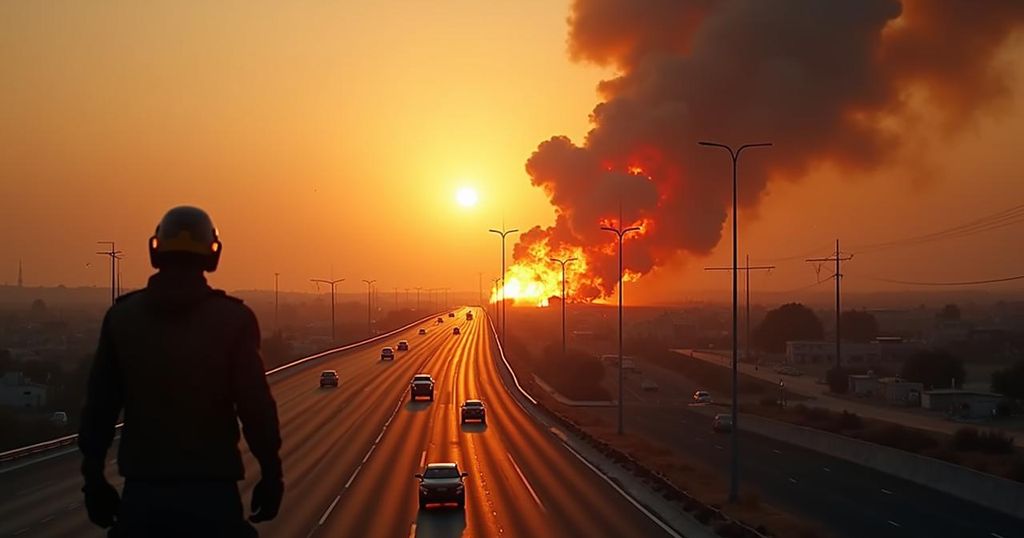Israeli Airstrike Disrupts Critical Lebanon-Syria Highway Amid Ongoing Conflict

An Israeli airstrike has disrupted a major highway linking Lebanon and Syria amid escalating conflict between Israel and Hezbollah. This event coincides with Iranian officials’ discussions in Lebanon and has raised concerns over the ongoing humanitarian crisis, with reports of significant casualties on both sides. International reactions, particularly from Australia’s leadership regarding Iran’s comments on Hezbollah, underline the intricate diplomatic implications of the situation.
An Israeli airstrike has severed a vital highway connecting Lebanon and Syria, as reported by Lebanon’s state-run National News Agency. This airstrike resulted in the closure of a road near the Masnaa Border Crossing, a critical route that has been used by tens of thousands of people fleeing the ongoing conflict in Lebanon to seek refuge in Syria over the last two weeks. The developments follow Israel’s recent ground incursions into Lebanon against Hezbollah, alongside airstrikes in Gaza which have resulted in numerous casualties, including children. Since the conflict escalated after Hamas’ attack on October 7, 2023, Israel has declared war on Hamas, resulting in more than 41,000 Palestinian deaths, with the Lebanese Health Ministry reporting nearly 2,000 fatalities in Lebanon. Concurrently, Iran’s Foreign Minister Abbas Araghchi is meeting with Lebanese officials in Beirut to discuss the war between Israel and Hezbollah. Iran is a significant supporter of Hezbollah, providing it with weaponry and financial aid over the years. His visit coincides with new Israeli airstrikes across various regions in Lebanon, including Beirut’s suburbs and the Bekaa Valley. Araghchi’s arrival follows a recent escalation in hostilities where Iran launched at least 180 missiles into Israel, raising the specter of a broader regional conflict. Lebanon’s National News Agency reported that the Israeli airstrike has marked the first time this crucial border crossing has been disrupted since the onset of the current conflict. Notably, despite this blockage, several other border crossings between Lebanon and Syria remain operational. Hezbollah is believed to be receiving a significant portion of its weaponry from Iran, facilitated through Syrian territories, as the group continues to engage alongside Syrian forces in the ongoing conflict. Meanwhile, in a separate but related global dimension, Australian Prime Minister Anthony Albanese condemned remarks made by Iran’s ambassador praising a slain Hezbollah leader, asserting the government’s stance against support for terrorist organizations but refraining from expelling the envoy based on existing diplomatic relations with Iran.
The article addresses the ongoing conflict in the Middle East, particularly focusing on the escalating tensions between Israel and Hezbollah. Following significant military actions, including ground incursions and airstrikes, Lebanon has seen a substantial influx of refugees into Syria due to the war. The broader implications of these actions involve the role of Iran as a key supporter of Hezbollah, further complicating the regional dynamics. The historical context of the Israel-Hezbollah conflict, alongside recent escalations, is fundamental to understanding the situation.
This recent Israeli airstrike cutting the highway between Lebanon and Syria marks a significant point in the evolving conflict, reflecting the ongoing hostilities and the humanitarian crisis resulting from the war. With Iranian support for Hezbollah and the recent military actions taken by both Israel and Hezbollah, the situation remains precarious and could potentially escalate into a wider regional conflict. Furthermore, international reactions, such as Australia’s diplomatic stance towards Iranian officials, highlight the complex geopolitical landscape surrounding this crisis.
Original Source: abcnews.go.com





